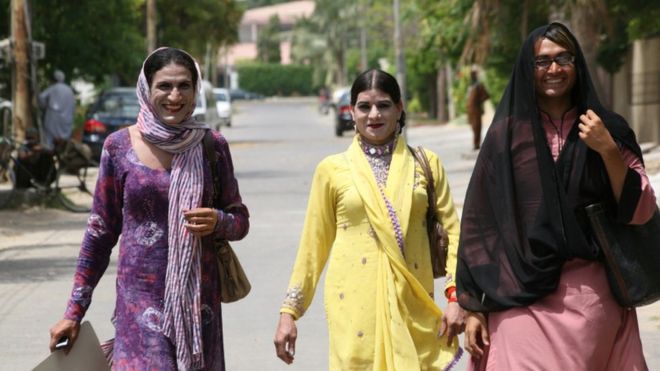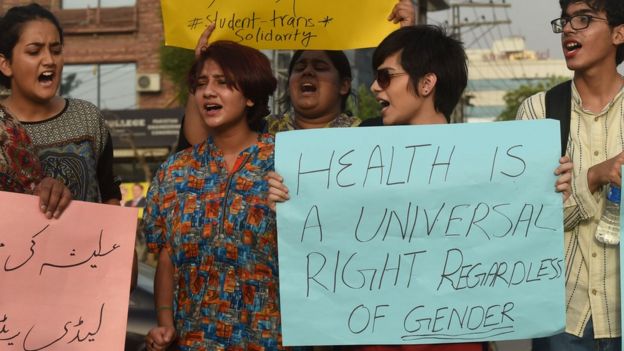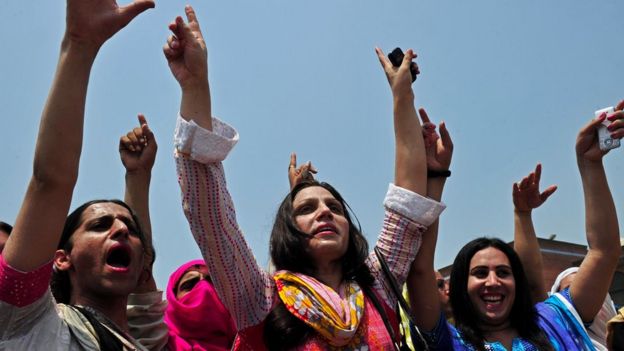In Pakistan You Say?!!!
"We are pushing for this bill because it is the right of these people, not only a right as human beings but as citizens of this country."
"There is overwhelming support from other major political parties. No one has opposed it."
Naeema Kishwar Khan, Pakistani member of Parliament
"[As a result of historical and cultural perceptions, Pakistanis tolerate transgender people, because the group represents] a minority that doesn't threaten anyone."
"They have this status as God's chosen people. In the South Asian imagination, there is this idea that they have powers to bless and curse people, which is why you see people from this community at wedding ceremonies or when children are born."
Nadeem F. Paracha, columnist, Dawn Newspaper, Pakistan
"We are overwhelmed by how supportive the state has been to this law -- we have so much hope."
"I jumped off the bike and started running while he came after me swearing and screaming that he would shoot me. But as traumatizing as that experience might seem, it's a very common thing in our lives -- that even a policeman thinks we are fair game."
"So after this bill passes, what the government really needs to do is start a campaign to sensitize the masses, government officials, policemen, everyone."
"That's the real challenge."
Mehiab Jameel, 25, anthropologist, feminine expression transgender person
 |
| Bhasker Solanki The transgender community faces discrimination in Pakistan and finding employment is a challenge |
With the very most sincere of wishes, good luck on that one! On the other hand, perhaps transgender people in Pakistan -- a religiously straitened country where Christians are threatened with the full force of the law that can see them imprisoned and even face capital punishment if they are perceived to be blaspheming Islam or the Prophet, and those Muslims who dare to defend Pakistani Christians are just as likely to be assassinated for their troubles as Christians are to be slaughtered by mobs of bloodthirsty Muslims -- really do stand a chance of acceptance.
After all, if indeed there is a tradition of tolerance for transgender people in a society where women are to be sequestered, kept out of the public eye, tethered to home and child-bearing, it is entirely possible that this law which seems so out of joint with Pakistan's virulent detestation for any religion other than Islam, and deep suspicion and contempt for foreigners, particularly of the Western variety, the way could be made for security to entitle these people to protection under the law.
The experience of 35-year-old Nadeem Kashish, currently the leader of Pakistan's She-Male Association for Fundamental Rights, was not that of a respected person in the community, as described so delicately by Mr. Paracha: "God's chosen". She speaks of herself as a child viewed as effeminate earning her ridicule and violence and her experience of humiliation made to perform in a circus as a teenager of decided oddity. Attempting to live as an adult man, she married but the woman who bore his/her son died in childbirth, before she/he finally accepted herself as a transgender woman.
She spent years living in a community of "Khawaja siras", third sex, the community inclusive of cross-dressers, eunuchs and intersex people along with the transgendered. Their families would have nothing to do with them, they were routinely subjected to discrimination in society and to violence. Living among adoptive families of like people these communities have a mother-figure, a guru providing shelter and protection in exchange for earnings being handed over from sex work, dancing or begging.
Ms. Kashish eventually had enough of this kind of enforced servitude, of being taken advantage of, opening a small shelter of her own in Islamabad for transgender people shunned by their families and attempting to avoid the Khawaja sira system that exploits young transgendered people having nowhere else to turn for comfort and security.
Under these conditions and circumstances it hardly seems likely that an entire population where families shun and disengage completely from their transgendered relatives, leaving them to cope on their own, to be exploited and to experience contempt and violence as their just desserts, would be amenable to a wholesale turnabout in social attitudes.
 |
| A transgender activist, Alisha, died last month after delays in treatment at a local hospital Getty Images |
The real challenge of which Ms. Jameel speaks does not arrive from a top-down approach, in any event, but from a bottom-up transition. And under the prevailing conditions where all Middle East and Asian mostly Muslim societies view other-gendered people as unclean and beyond contempt, acceptance will be a long time coming, unfortunately.
To the credit, surprisingly enough, of the Supreme Court, a 2012 declaration was issued declaring equal rights for transgender citizens that included the right to inherit property and equal opportunity in education and employment. They were granted voting rights in 2011. Transgendered people were included in the country's national census for the first time and in June the government issued passports including a category for the transgendered.
Finally, and astonishingly, a group of Pakistani clerics issued a religious edict last year stating that people with "visible signs" of male or female atttributes could marry someone of the opposite sex. Societal attitudes, however, for the most part remain etched in stone. The transgendered remain shunned and abused. Unable to find employment they are forced to become beggars or prostitutes.
 |
| A social worker said the fatwa was a good step, but that issues would still remain until transgender marriage was officially legitimised Getty Images |
Labels: Human Relations, Human Rights, Pakistan, Transgendered

<< Home